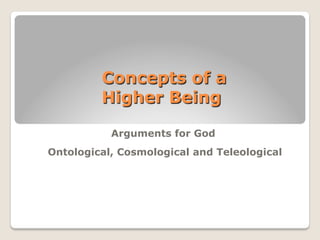The document discusses three classic philosophical arguments for the existence of God:
1. The ontological argument claims that God must exist by definition since existence is greater than non-existence and God is defined as the greatest being possible.
2. The cosmological argument claims that everything in the universe requires a cause, so the universe itself must have been caused by a first cause, which is God.
3. The teleological argument claims that the order and complexity of the universe indicates intelligent design by a creator, which is God.










